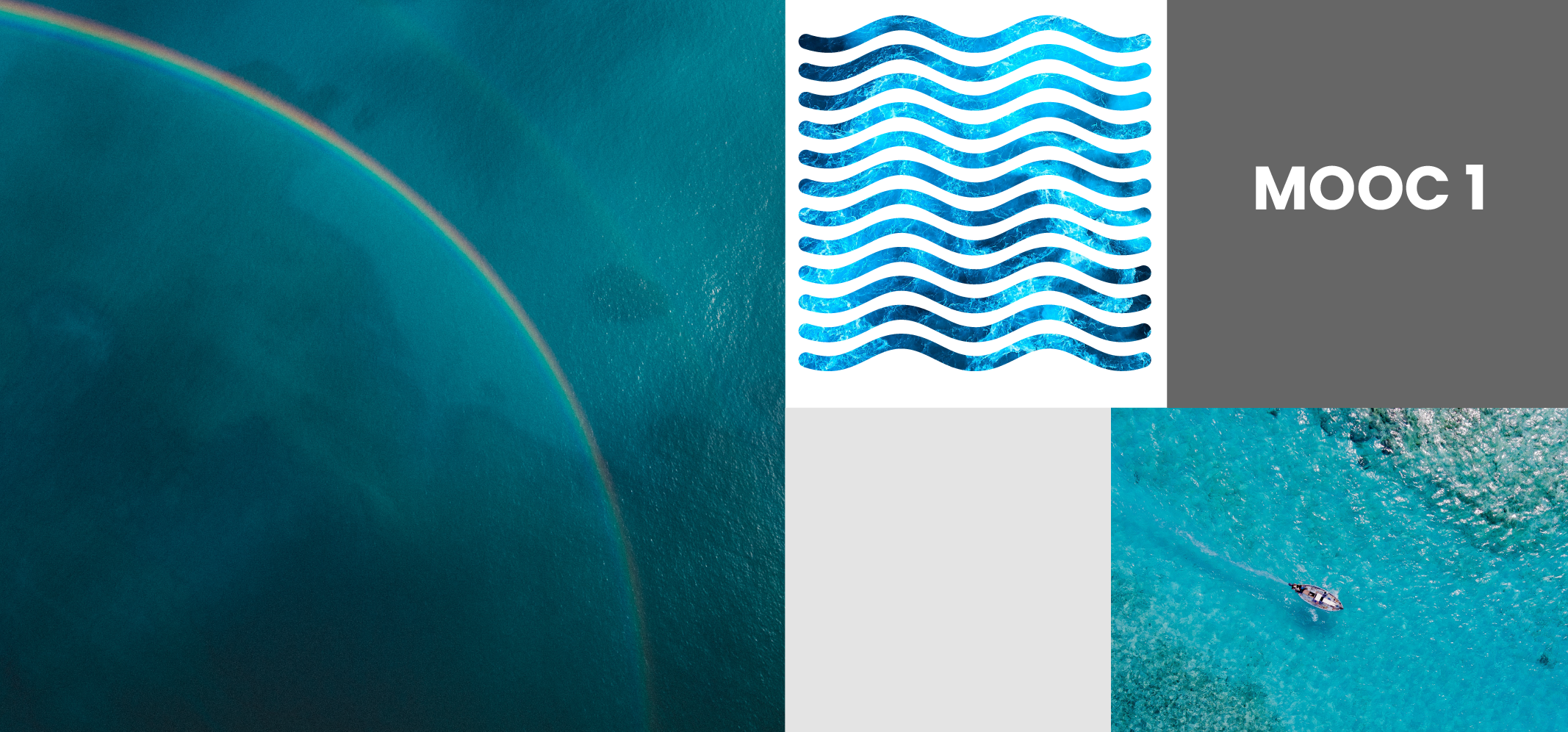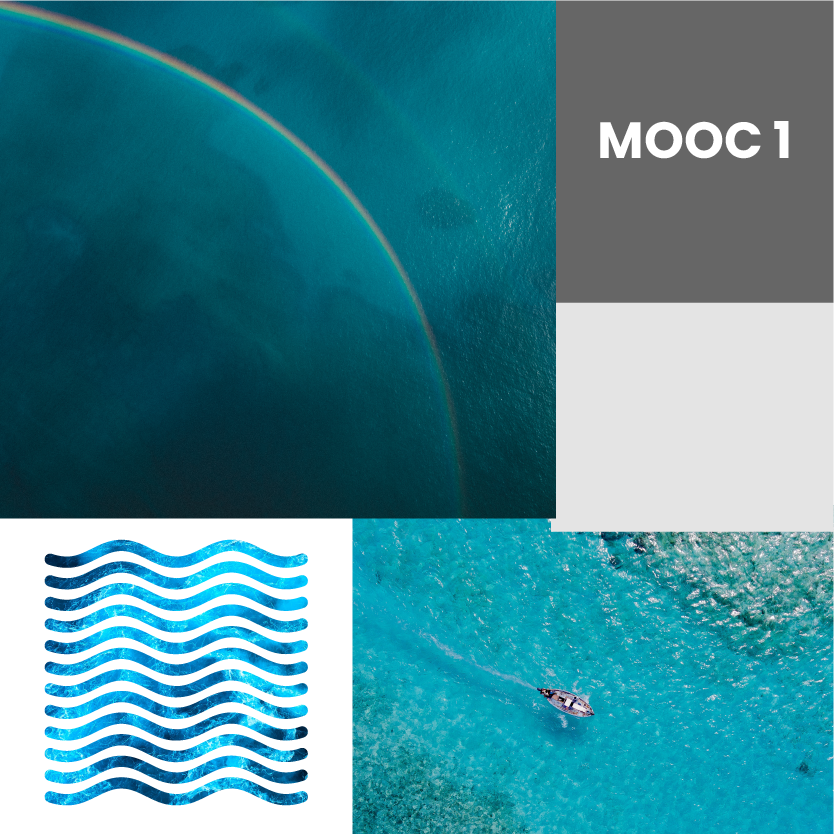MOOC 1
Introduction: why the sea is important to us
Today, on #WorldHabitatDay, we start our first MOOC. Every Monday, Wednesday and Friday in October we will dive into the topic of healthy seas and explore why and how these are vital for us.#GES4SEAS #MOOC #health pic.twitter.com/GzcA5J6Wdl
— ges4seas_mooc (@ges4seas_mooc) October 2, 2023
Just look at the shear size of the oceans!
— ges4seas_mooc (@ges4seas_mooc) October 2, 2023
Let's spin the earth to where the oceans shape our globe!
Our earth is a world of water. Try it yourself: https://t.co/HAljsTtKNF pic.twitter.com/FExzD7PAij
Did you know? The tree of life has 34 branches (phyla) in the oceans, 17 in freshwater and only 15 on land! The oceans support a great diversity of life with some of the largest animals (such as the blue whale) and some of the smallest organisms as well.
— ges4seas_mooc (@ges4seas_mooc) October 2, 2023
Some impressive numbers:
— ges4seas_mooc (@ges4seas_mooc) October 2, 2023
9⃣0⃣% of traded goods are transported over the sea (https://t.co/5TDHjBUTUi)! The annual per capita consumption of aquatic foods is around 2⃣0⃣ kg (https://t.co/VibYulgvp3)! And 4⃣0⃣% of people live within 100km from a coast!
But wait! You still benefit when you live far away from the ocean ... the ocean shapes the features of earth, from sediments to the air we breathe. Did you know that every other breath you make comes from the ocean?https://t.co/6O10mZIl5W pic.twitter.com/ySPoXSeOuq
— ges4seas_mooc (@ges4seas_mooc) October 2, 2023
We will collect the feedback and take it up again later in the MOOC.
— ges4seas_mooc (@ges4seas_mooc) October 4, 2023
(image adapted from https://t.co/iOAbgrSza1) pic.twitter.com/RrRWl0phXl
We've seen examples of how the sea benefits us as a society, through e.g. its biodiversity, the air we breathe or just as a medium of transportation. What would happen if the oceans could not provide all these benefits anymore? What are the threats?#GES4SEAS #MOOC #health
— ges4seas_mooc (@ges4seas_mooc) October 6, 2023
When 14 million tons of plastic find their way into the oceans annually (https://t.co/I4RzuVSqW5), they also find a way back, e.g. into the seafood we eat.
— ges4seas_mooc (@ges4seas_mooc) October 9, 2023
When we are the source of the problem, then we are also the solution! (image by Vaidehi Shah, CC-BY-2.0) pic.twitter.com/QZdeu1CsdB
But wait! Some programmes (such as the European Marine Strategy Framework Directive, MSFD) also have "sustainable use" in their definition of "good environmental status" (i.e. proper tourism, eating fish, produce energy, shipping, land reclamation, coastal defense, ...). pic.twitter.com/mxGJ9BylWz
— ges4seas_mooc (@ges4seas_mooc) October 11, 2023
So, the message here is:
— ges4seas_mooc (@ges4seas_mooc) October 11, 2023
"Ocean health" cannot mean a pristine environment but one that can be as healthy as possible under the sustainable uses we as a society agree upon!
So, ocean health starts as a scientifically defined concept of nature but in practice always ends up as being a policy-defined reachable target when it is put into legal action, sometimes far away from what science says.
— ges4seas_mooc (@ges4seas_mooc) October 13, 2023
The most difficult part is to agree on such a common goal and then to really take the action to achieve it. David Attenborough had this to say about it:https://t.co/tHb34mY8yo
— ges4seas_mooc (@ges4seas_mooc) October 13, 2023
1) The 1️⃣0️⃣% goal as one of the 20 Aichi targets agreed in 2010 implementing the Convention on Biological Diversity @UNBiodiversity:https://t.co/XRYm1lijpO pic.twitter.com/HyVNVzr50s
— ges4seas_mooc (@ges4seas_mooc) October 13, 2023
2) The 5️⃣0️⃣% goal is the "half-earth project" by the E.O. Wilson biodiversity foundation @EOWilsonFndtn:https://t.co/xDu9ffoQkx pic.twitter.com/KSFBgGNuAW
— ges4seas_mooc (@ges4seas_mooc) October 13, 2023
Let's make a list of some elements of a healthy society.
— ges4seas_mooc (@ges4seas_mooc) October 16, 2023
The question to ask is: what do we humans need to thrive both physically and mentally and to maintain a stable society?
✔️ good health via clean air, water, soil
— ges4seas_mooc (@ges4seas_mooc) October 16, 2023
✔️ leave no-one behind (equal rights and equal chances)
✔️ an economy that puts all beings at the center of economic policy
✔️ sustainable development
Do you have more suggestions?
On the other hand, it seems some elements are not connected to ocean health at all ... such as "leave no-one behind" ... but think again!
— ges4seas_mooc (@ges4seas_mooc) October 18, 2023
What if someone powerful enough just walked into your kitchen each day and took most food out of the fridge, just walking away.
Some coastal communities in West Africa have fish as a significant food and source of income. But fleets of foreign fishing vessels just enter their waters depleting the fish stocks. These communities are left behind. Read on ...https://t.co/0d82ppzYV0
— ges4seas_mooc (@ges4seas_mooc) October 18, 2023
Some elements of social health do not allow much compromise (such as sustainable exploitation of the ocean) as we cannot stop it completely.
— ges4seas_mooc (@ges4seas_mooc) October 20, 2023
Can we use this knowledge to make both ends meet?
— ges4seas_mooc (@ges4seas_mooc) October 20, 2023
The bottom line is:
— ges4seas_mooc (@ges4seas_mooc) October 23, 2023
We cannot have healthy societies without healthy oceans.
This means, we need to maintain ocean health where we still have it, and achieve it where we don't have it anymore. And 'achieving' means to get to a 'good status'.
This balance must be figured out for every single issue where we as society are in conflict with ocean health. This is done by what is called "ecosystem-based management" (EBM) and will be the topic of #MOOC 5. 'Monitoring' and 'management' are the keywords here.
— ges4seas_mooc (@ges4seas_mooc) October 23, 2023
Let's shortly take them one by one as examples of how different this balance between human needs and ocean conservation would look like. Think of all the difficulties you would face when you were a manager and should solve these issues!
— ges4seas_mooc (@ges4seas_mooc) October 25, 2023
#Food: some people depend on seafood. As food is essential to society, the balance here tends to lean more towards fishing than conservation. Excellent fisheries management is key here! Here's the @Europarl_en take:https://t.co/rFmUs6jt2W
— ges4seas_mooc (@ges4seas_mooc) October 25, 2023
#ClimateRegulation: a stable climate is essential for humans and oceans. There is only marginal room for balance, climate and ocean are too tightly connected. Unhealthy oceans result in even faster climate change and unhealthy society. @OceanCTrust says: https://t.co/qD9sd67vW0
— ges4seas_mooc (@ges4seas_mooc) October 25, 2023
We now basically know how to start solving the burning issues we have, and get to healthy oceans that will allow healthy societies. What remains is to actually take the action and find the right balance.
— ges4seas_mooc (@ges4seas_mooc) October 27, 2023
You like quotes? One of our partners in the #GES4SEAS project coined it this way. pic.twitter.com/FFX0ksMcbJ
— ges4seas_mooc (@ges4seas_mooc) October 27, 2023
And finally, here's everything in a nutshell with some of the examples of human uses and benefits from the sea and a (hopefully) healthy sea in the center of all our work! pic.twitter.com/bcEBsX97rU
— ges4seas_mooc (@ges4seas_mooc) October 27, 2023
In between, we will randomly post new and interesting material from the #GES4SEAS project and associated science. There is so much to share!
— ges4seas_mooc (@ges4seas_mooc) October 30, 2023
This 1st MOOC was a bit experimental. We tried things out to see how it worked for us. MOOCs on Twitter/X (and Mastodon!) are rare and not the easiest medium to present complex stuff in. 280 characters is so difficult to work with (Mastodon has 500, it is much easier there!).
— ges4seas_mooc (@ges4seas_mooc) October 30, 2023
However, it forces us to be precise in wording and help clarity. We now would like to have some feedback from our audience. What did you like and what not? Were there too many posts, too few? Was the content too superficial or too complex? Tell us what you think!
— ges4seas_mooc (@ges4seas_mooc) October 30, 2023




